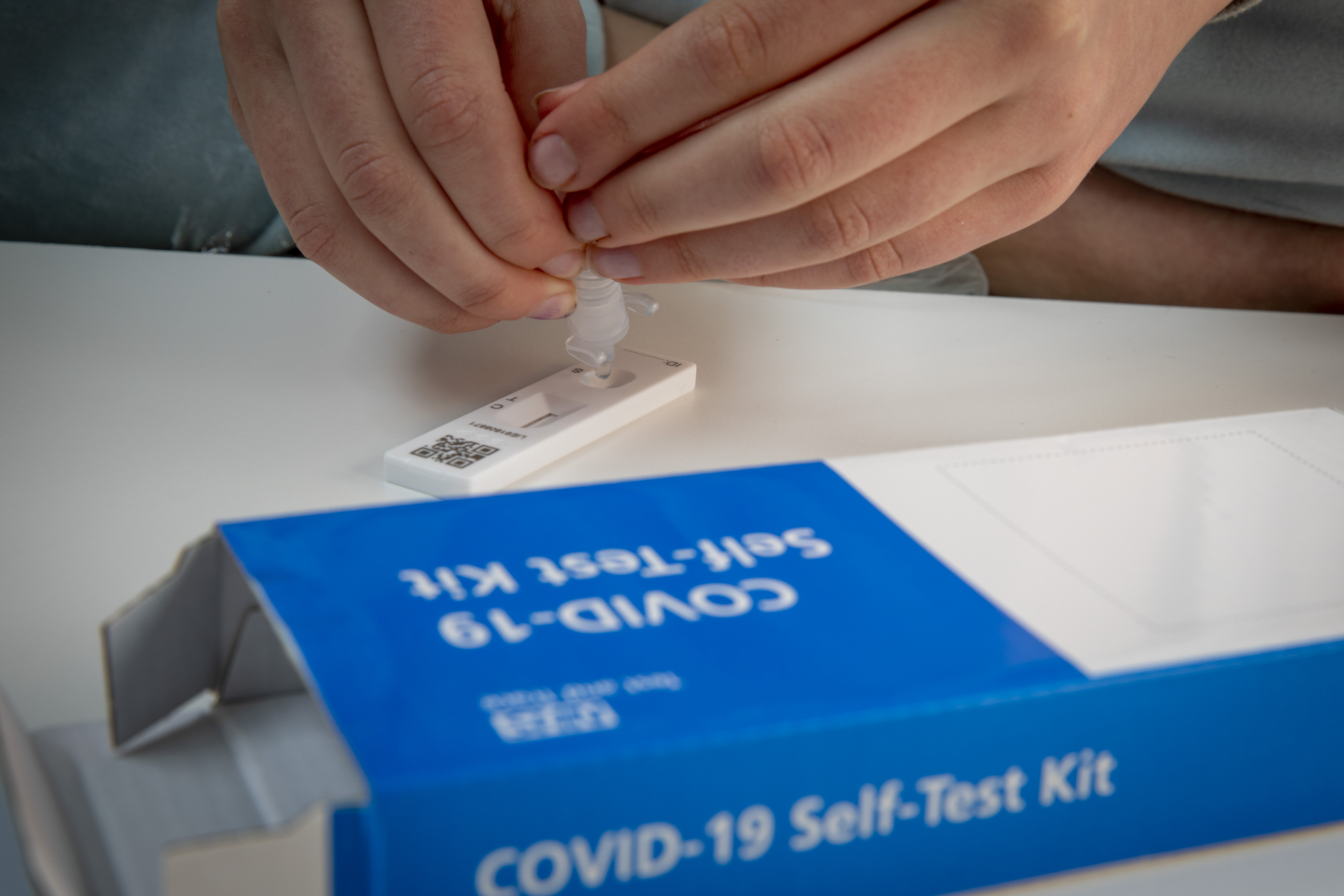Are schools closing again due to Covid? What the new Omicron variant means for the 2022 school term


In the wake of the government's Plan B measures and a new variant, parents are wondering whether schools are closing again.
An increase in Covid cases and concerns around the Omicron symptoms across the UK has understandably had the public worrying. With many wondering if it's likely we'll go back into lockdown following new rules on face masks and a return to working from home throughout January.
Previous lockdowns have resulted in school closures and parents homeschooling their children. All in an effort to reduce the virus transmission. But with Boris Johnson increasing the availability of booster Covid jabs and speeding up the 12-15 year-olds vaccinations plan, it's hoped that a full lockdown could be avoided.
As children return to school this January, the Department of Education have offered up new information on what the current coronavirus stance means for face-to-face learning.
Are schools closing again due to Covid?
Education Secretary Nadhim Zahawi, who has since been moved to the position of Chancellor, has confirmed that schools in England will not close early and continue to remain open in January.
Taking to Twitter on January 2, 2022, the minister said that he was "looking forward to welcoming pupils back" to school and college during the first week of term.
"I know we face challenges with the Omicron variant but as the Prime Minister and I have made clear, education is our number one priority," he wrote.
Parenting advice, hot topics, best buys and family finance tips delivered straight to your inbox.
The Education Secretary further re-affirmed his stance to keep schools open in a piece he wrote for the Sunday Telegraph. Here he stated that "there can be no excuse for our childen not learning face to face in the classroom where they want and need to be". Whilst additionally sharing his intentions that this year's school "exams will go ahead as planned".
Despite his firm stance, Mr Zahawi accepts that increased Covid cases across England will impact education. And that in cases were children and staff are self-isolating - remote learning will be "necessary".
He told headteachers that merging classes and teaching virtually can be an option for headteachers. Especially in the wake of staff shortages. However, the Department of Education has previously expressed that pupils being sent home due to covid should only be done as a "last resort".
"COVID-19 continues to be a virus that we learn to live with and the imperative to reduce the disruption to children and young people’s education remains," they state. "Our priority is for you to deliver face-to-face, high-quality education to all pupils."
Guidance for parents, pupils and teachers on schooling during the pandemic can be found in the government's Schools COVID-19 operational guidance document. Updated in January 2022, it set outs current COVID safety protocols expected in schools. This includes mandatory face masks and increased testing.
Are schools closing again in Wales?
No, schools in Wales will remain open in January 2022.
Concerns over Omicron and increased Covid cases meant that schools in Wales were granted two extra days at the start of term in January to prepare for the return of students. This was to give education facilities time to put into place new covid measures to ensure safe learning going forward.
The new school rules include staggered start and finish times, the return of face masks for staff and students in secondary schools and increased testing.
"Moving forward, our strong expectation is that all staff and learners of secondary age should test three times a week before entering school using LFDs (on Monday, Wednesday and Friday) and record their results," reads a statement on the Welsh government website.
The Welsh First Minister also said that schools should prepare for remote learning. Especially amidst staff shortages in January due to positive cases.
"In some places where teachers aren’t in, and other school staff aren’t able to be there, they will have to plan for some period where children will have to be taught remotely," Mark Drakeford told the BBC. "But that’s a decision that is best made in that very local context by people who are as close to it as possible. Things are best done at the school level because different schools face different challenges."
Are schools closing again in Scotland?
No, schools in Scotland will not be closing again according to the First Minister.
On December 21 2021, Nicola Sturgeon told ministers in the Scottish Parliament that schools would re-open after the Christmas break:
"It remains our priority to re-open schools as normal after the holidays," she told MSPs.
During the same address, Nicola Sturgeon announced new Covid measures in hospitality venues and for outdoor sport events. Which came into effect from Boxing Day and currently remain in place in January. These were "sacrifices" that she was asking Scots to make "to help minimise any impact on children’s education."
"To help ensure that schools are safe environments for young people and staff, updated guidance based on the recommendations of the Education Advisory Sub-Group was published at the end of last week," she added.
These recommendations included the reintroduction of social distancing. Plus mandatory face masks for teachers who are in close contact with pupils. Schools have also received new air-cleaning units and resources to increase on-site Covid testing during the January term.
What are the new Covid guidelines in schools?
Increased testing, contact tracing and mandatory face masks in communal areas are the government's new Covid guidelines currently in place in schools across the UK. And it is hoped that following their advice will help stop schools closing again.
The measures issued by the DofE apply to both staff and students at primary and secondary schools (including sixth form). They also apply to boarding and specialist learning schools, and post-16 education providers and academies.
The department highlighted that their "advice remains subject to change as the situation develops". This means pupils should continue to follow procedure until the government says otherwise.
Face Masks:
Face masks are to be worn by secondary school students when outside of the classroom.
An email update from the DofE said, "Face coverings should be worn in communal areas in all settings by staff, visitors and pupils or students in Year 7 and above, unless they are exempt.
"Pupils or students (in Year 7 or above) should continue to wear face coverings on public and dedicated school transport, unless they are exempt," they added.
In primary schools only staff and adult visitors should wear face masks when moving around in corridors and communal areas. Though primary school children are not required to wear a covering in accordance with current national health advice.
The same guidelines apply to those in education in Scotland. Whilst Wales and Northern Ireland have gone one step further. And asked both kids and teachers to wear face masks in classrooms too.
https://www.youtube.com/watch?v=MgECMsEY0IE&t=41s
In contrast, Education Secretary Nadhim Zahawi has ruled out face masks during class in England. This is because he and other MPs believe face coverings "can impede or hinder communication in a classroom."
The school guidelines follow new face mask rules on trains, supermarkets and hospitals set out by Boris Johnson. The Prime Minister asked that the public go back to wearing face coverings in wake of the Omicron variant.
Isolation:
NHS Test and Trace will be continuing contact tracing in schools.
If your child comes into close contact with a suspected case at school, parents will be alerted by Test and Trace. And they will be told further instructions on what to do next.
"As of Tuesday 14 December, all contacts of someone with a positive case of COVID-19 – whether Omicron or not – should take an LFD test every day for 7 days," says the Department of Education. This includes fully vaccinated adults and children aged 5-18 years and 6 months.
If one of these lateral flow tests returns as positive, the individual must get themselves a PCR test. They must isolate until they receive the PCR test result (even if no symptoms show). And if positive, should then start an isolation period of 10 days. After this date, they may then return to school.
If staff and students are regularly testing negative then they are expected to attend school. As the DofE stressed:
"Pupils should only stay away from school if they have symptoms or they get a positive test result. They can still attend if undertaking daily contact testing."
Lateral Flow tests:
The Department of Education are asking pupils to do lateral flow tests twice a week during school term.
"Staff in all education and childcare settings and students, of secondary school age and above should continue to test twice weekly at home with lateral flow device (LFD) test kits, 3-4 days apart, for the remainder of the autumn term and on return in the spring term," they stated on their Education hub blog.
This increased testing is important in January 2022. With the DofE adding that this would "help reduce transmission after a period of social mixing" in December.

Headteachers must ensure plentiful lateral flow test supplies. So that all pupils can carry out testing protocol from the new year onwards.
"We understand that this is a significant additional ask. But testing continues to play a vital role in keeping Covid-19 out of schools," said the DofE in an email to schools. This is turn will help any future possibility of schools closing again due to covid outbreaks.
Video of the Week:

Emily Stedman is the former Features Editor for GoodTo covering all things TV, entertainment, royal, lifestyle, health and wellbeing. Boasting an encyclopaedic knowledge on all things TV, celebrity and royals, career highlights include working at HELLO! Magazine and as a royal researcher to Diana biographer Andrew Morton on his book Meghan: A Hollywood Princess. In her spare time, Emily can be found eating her way around London, swimming at her local Lido or curled up on the sofa binging the next best Netflix show.